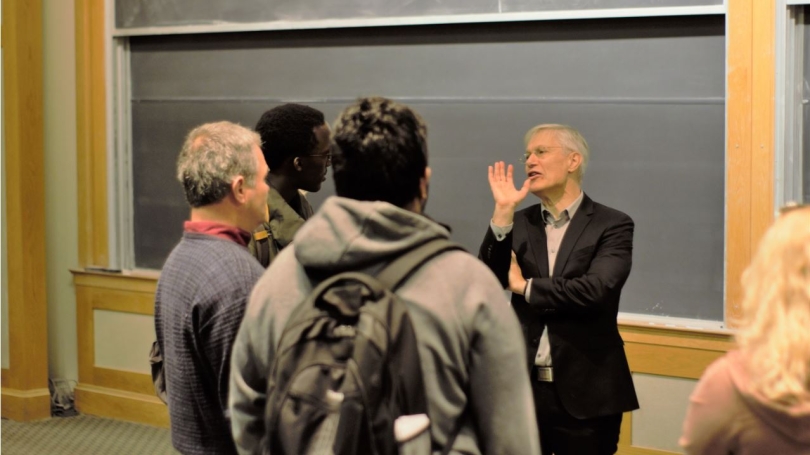
- Public Policy
- Leadership
- Funding
- News & Events
- About the Center
Back to Top Nav
Back to Top Nav
Back to Top Nav
Back to Top Nav
Visiting speaker Yaron Brook, Chairman of the board of the Ayn Rand Institute, visited Dartmouth on February 27th to lecture as part of his speaking series, The Moral Case For Capitalism. As the title suggests, not only did Dr. Brook address the precipitous decline in global poverty and unprecedented material wealth that has resulted from industrialization and free trade - he takes those as givens - but he offered an ethical case for profit-seeking selfishness. Dr. Brook posited that some of the greatest technological innovators, such as Bill Gates and Steve Jobs, produced Windows and Macintosh, respectively, because these products made their lives better. Their innovations only translated to the accumulation of such monumental wealth because customers were willing to pay for their products only because their lives were made better off by at least that dollar amount and, in all likelihood, significantly moreso. Anybody who has taken high school economics or Econ 001 at Dartmouth should be able to immediately recognize what Yaron Brook is describing here: consumer surplus! Yet, Dr. Brook explains, we do not herald these titans of industries as heroes but we portray them as villains unless they donate their wealth or create charitable institutions such as the Bill and Melinda Gates foundation.
Provocatively, Dr. Brook does not stop after demonstrating that self-interest and the pursuit of one’s own happiness isn’t just a moral virtue, but he takes his argument a step further by claiming that selflessness is immoral. For example, Dr. Brook describes altruism as an ideology which advocates “sacrifice for the sake of sacrifice, suffering for the sake of suffering; not the benefit you give other people” (35:55-36:01). Continuing in this iconoclastic vein, citing the quintessential Western example of selflessness in the crucifixion of the sinless Jesus Christ to redeem the sinful humans who crucified him, Dr. Brook remarked: “I can’t think of a more unjust thing. I can’t think of a more horrible thing than an individual suffering for sins that other people commit. And yet, that is the ideal of morality” (37:09-37:20).
During the question and answer portion of the talk, Yaron Brook fielded questions from students and other observers which are routinely lobbed at laissez-faire free marketers as indefensible failures of capitalism that must be kept in check by the leviathan of the state. One such query was whether we can consider globalist capitalism moral when the fact remains that child labor is used in developing countries to produce products that we enjoy on a daily basis. Dr. Brook parried this jab with a shocking degree of eloquence and persuasion by articulating that these children, without their factory jobs, would be subject to the elements and rigors of subsistence farming or starving to death. Furthermore, Dr. Brook posited that developing nations must undergo this period - like contemporary first-world nations like the United States and United Kingdom experienced in the 19th century - to reach a level of wealth which provides children the privilege of compulsory educations and child labor laws.
In conclusion, Dr. Brook’s visit was uniquely worthwhile because it exposed students and other audience members to a worldview and ethical arguments which are seldom discussed in the setting of a liberal arts college such as Dartmouth.
Quotations are excerpted from the lecture which can be accessed on YouTube at this link: https://youtu.be/StvQKWdTpOI
-Submitted by Kevin Larkin '22, Rockefeller Center Mini Grant Recipient
The Rockefeller Center's Mini-Grants program funds registration fees for students attending conferences, as well as the costs of bringing guest speakers to Dartmouth. The views and opinions expressed here are the author’s own and do not necessarily represent the views and opinions of the Rockefeller Center or constitute an endorsement by the Center.